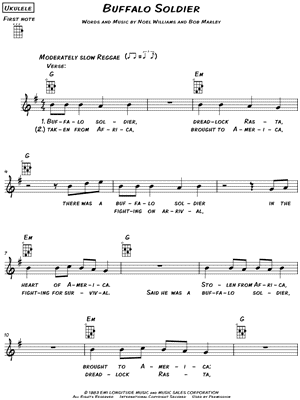
Brand new site with 1600+ Professional MIDI files, all with demos, including Reggae MIDI files! Now accepting Pay Pal! My Account view order history and download songs; Reggae MIDI Files. Avion Blackman. Yeshua – Grace And Peace – Let It Go – Barefoot Man. Shame And Scandle – Bob Marley. Buffalo Soldier – I Shot The Sheriff.
Wait for the sheet music viewer to load in a few seconds
Click Here if it doesn't refresh within 20 seconds.
Bob Marley: Buffalo Soldier for voice, piano or guitar, intermediate sheet music. High Quality and Interactive, transposable in any key, play along and easy practice by changing the tempo, and more. Includes an High Quality PDF file to download instantly. Licensed to Virtual Sheet Music® by Hal Leonard® publishing company. NOTE: The sample above is just the first page preview of this item.
Buy this item to display, print, and play the complete music.
Link to this page |
💡 Would you like to learn more about this musical piece? Check out the contents below...| Buffalo Soldier by Bob Marley for voice, piano or guitar |
$2.99 (save 63%) if you become a Member!(learn more...) This is a Hal Leonard digital item that includes: About 'Buffalo Soldier'
Digital sheet music for voice, piano or guitar
NOTE: chords, lead sheet indications and lyrics may be included (please, check the first page above before to buy this item to see what's included).
This item includes: PDF (digital sheet music to download and print), Interactive Sheet Music (for online playback, transposition and printing)
This item is also available for other instruments or in different versions: |
|
- Avion Blackman
- Barefoot Man
- Bob Marley
- Cedrick Luces
- Christafari
- Dennis Brown
- Eddie Lovette
- Gregory Isaacs
- Harry Belafonte
- Jimmy Cliff
- Johnny Nash
- Third World
- Wailing Souls
Buffalo Soldier Midi Download Sites Download
Reggae MIDI Files
Buffalo Soldier Midi File
Stylistically, reggae incorporates some of the musical elements of rhythm and blues (R&B), jazz, mento, calypso, African, and Latin American music, as well as other genres.
Reggae is played in 4/4 time because the symmetrical rhythmic pattern does not lend itself to other time signatures such as 3/4 time. One of the most easily recognizable elements is offbeat rhythms; staccato chords played by a guitar or piano (or both) on the offbeats of the measure, often referred to as the skank.
This rhythmic pattern accents the second and fourth beats in each bar and combines with the drum’s emphasis on beat three to create a unique sense of phrasing. The reggae offbeat can be counted so that it falls between each count as an “and” (example: 1 and 2 and 3 and 4 and etc.) or counted as a half-time feel at twice the tempo so it falls on beats 2 and 4. This is in contrast to the way most other popular genres focus on beat one, the “downbeat”.
The tempo of reggae is usually slower than ska and rocksteady. It is this slower tempo, the guitar/piano offbeats, the emphasis on the third beat, and the use of syncopated, melodic bass lines that differentiate reggae from other music, although other musical styles have incorporated some of these innovations.
Harmonically the music is essentially the same as any other modern popular genre with a tendency to make use of simple chord progressions. Reggae sometimes uses the dominant chord in its minor form therefore never allowing a perfect cadence to be sounded; this lack of resolution between the tonic and the dominant imparts a sense of movement “without rest” and harmonic ambiguity. Extended chords like the major 7th (“Waiting in Vain” by Bob Marley) and minor 7th are used though suspended chords or diminished chords are rare. Minor keys are commonly used especially with the minor chord forms of the subdominant and dominant chord (for example in the key of G minor the progression may be played Gm – Dm – Gm – Dm – Cm – Dm – Cm – Dm). A simple progression borrowed from rhythm ‘n blues and soul music is the tonic chord followed by the minor supertonic chord with the two chords repeated continuously to form a complete verse (“Just My Imagination” by The Temptations C – Dm7).
The concept of “call and response” can be found throughout reggae music, in the vocals but also in the way parts are composed and arranged for each instrument. The emphasis on the “third beat” of the bar also results in a different sense of musical phrasing, with bass lines and melody lines often emphasizing what might be considered “pick up notes” in other genres.
This excerpt is from http://en.wikipedia.org/wiki/Reggae
